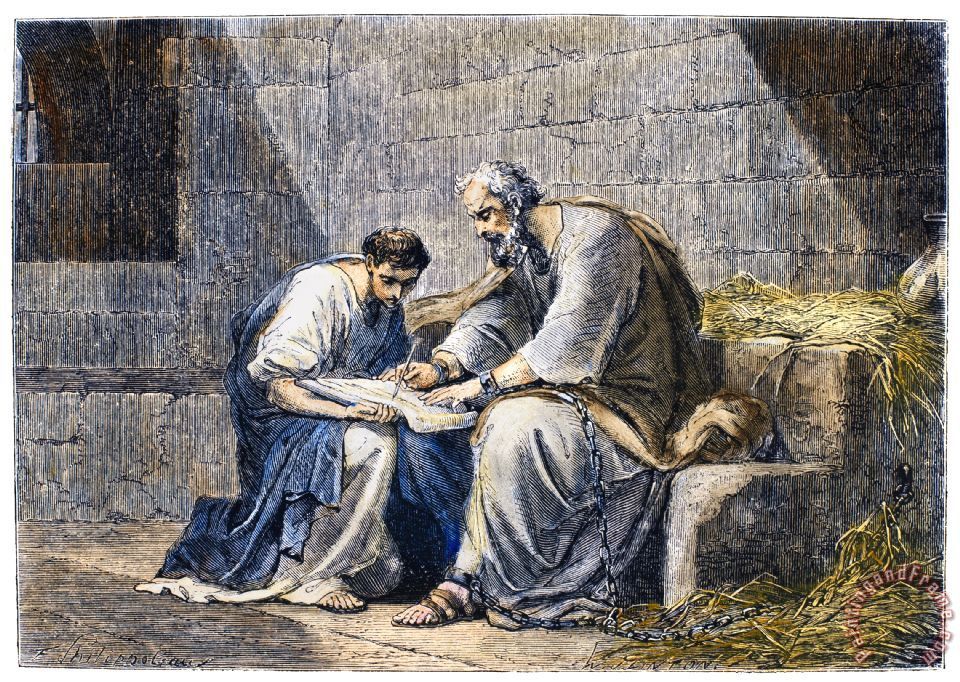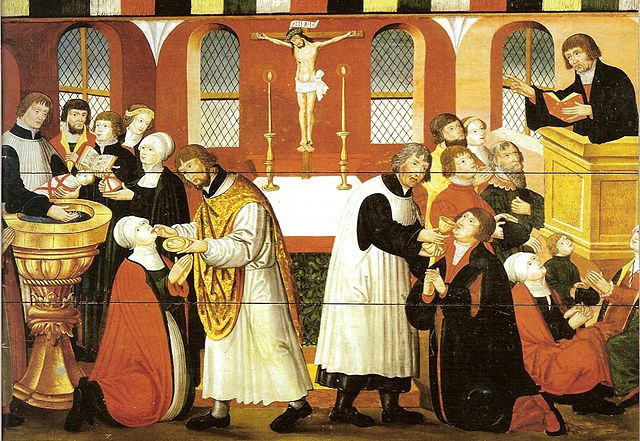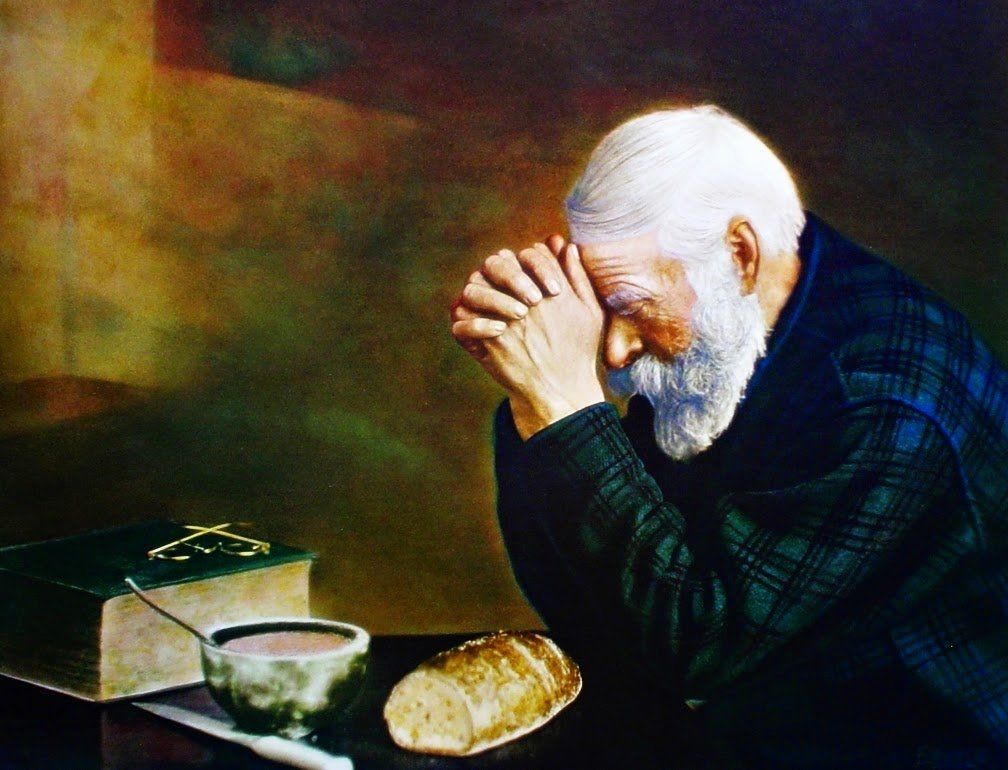Clean In God's Sight! (Mark 7:1-13)
Thirteenth Sunday After Pentecost, August 22, 2021
Grace be unto you, and peace, from God our Father, and from the Lord Jesus Christ. Amen.
Text: St. Mark 7:1-13, but especially these words –
So the Pharisees and teachers of the law asked Jesus, “Why don’t your disciples live according to the tradition of the elders instead of eating their food with ‘unclean’ hands?” He replied, “Isaiah was right when he prophesied about you hypocrites; as it is written: ‘These people honor me with their lips, but their hearts are far from me. They worship me in vain; their teachings are but rules taught by men.’ You have let go of the commands of God and are holding on to the traditions of men.”
In the name of the Father, and of the Son, and of the Holy Spirit. Amen.
Dear Friends in Christ Jesus:
When my brother and I were growing up, my dad often used the old saying – “Cleanliness is next to godliness.” Cleanliness is indeed something that we all like to see in one way or another. A mother might envision it as a house where her children keep their rooms neat and clean. A salesperson might think of it in terms of appearance. And we might even think of cleanliness as a desirable quality for the entire nation. We might picture houses looking so perfect and beautiful, and its sidewalks and streets swept .and maintained. Yes, cleanliness is to be sure next to godliness. There is just something about getting rid of all the dirt and stains and making something pure.
Our personal standard of cleanliness or purity is very important to each of us. But we are also to be concerned about another standard – God’s standard. What does it take to be clean before God? What does it mean to be pure in His sight? How can we sinful human beings hope to measure up? To find the answer, let’s look at today’s Holy Gospel lesson from the seventh chapter of St. Mark. Some Jews were discussing the same question with Jesus. He tells us, just as He told them, what cleanliness in God’s sight really means.
It is written – “The Pharisees and some of the teachers of the law who had come from Jerusalem gathered around Jesus.” The account that deals with cleanliness in God’s sight begins with people coming to see Jesus. Of course, the gospels are full of stories about people coming to see Jesus. What is important here, however, is not just that they came to see Jesus, but why they came to see Him. We might say that cleanliness in God’s sight begins with coming for the right reason.
Why did these Pharisees and teachers of the law come to see Jesus? St. Mark writes that they “saw some of his disciples eating food with hands that were ‘unclean,’ that is, unwashed.” Clearly, when these Pharisees and teachers of the law looked for Jesus, they weren’t looking for help or comfort or a Savor. They were looking for a chance to accuse. You see, they witnessed the disciples break a Jewish tradition. They didn’t wash their hands according to the Jewish ritual. Never mind that the washing of hands wasn’t required by the word of God but by tradition. The Pharisees and teachers of the law had come to Jesus to find fault – and they were pleased with their apparent success.
But before we point a self-righteous, accusing finger at these religious hypocrites, we need to examine our own cleanliness in God’s sight. Do we come to God for the right reason, or do we also, like the Pharisees and teachers of the law, sometimes come to God in order to find fault? When we come to worship Him here in His house, do we look for an opportunity to be offended by another church member? Do we dissect the liturgy or the hymns to find something that we may not like? Do we look for distractions to justify our lack of attention? All too often we are just like the Pharisees and teachers of the law – we come to God in order to find fault with His people!
But there’s another way. Cleanliness in God’s sight means, first of all, coming for the right reason. Ironically, just before this story in which people had come to Jesus to find fault, St. Mark tells us of people who came to Jesus for the right reason – to find help. It is written – “They ran throughout that whole region and carried the sick on mats to wherever they heard he was. And wherever he went…they placed the sick in the marketplaces. They begged him to let them touch even the edge of his cloak, and all who touched him were healed.”
People were coming to Jesus for the right reason – to find help and comfort. And it wasn’t just the physical help that they looked for, but, more importantly, spiritual help. That’s why Jesus offers the greatest help to the paralytic, when He says – “Son, your sins are forgiven” and only later states – “Get up, take your mat and go home.” If we want to be clean in God’s sight, we must also come to God for the right reason – to find help. It’s really strange how we can carry a problem around for quite some time…somehow forgetting that God is always there to help! As we come asking for His help, He promises to answer us. The psalmist proclaims – “You hear, O Lord, the desire of the afflicted…and you listen to their cry.”
Unfortunately, just as the people can come to God for the wrong reason, people can also listen to the wrong source. We see an example of this in the text – “So the Pharisees and teachers of the law asked Jesus, ‘Why don’t your disciples live according to the traditions of the elders instead of eating their food with “unclean” hands?’” These Jewish religious leaders really wanted to be pure in God’s sight, but they were listening to the wrong source – the tradition of men.
Many Jews thought that their heritage would make them clean in God’s sight. They looked down on all non-Jews as impure. They had even developed this self-righteous attitude into a formal tradition. As St, Mark noted – “The Pharisees and all the Jews do not eat unless they give their hands a ceremonial washing, holding to the tradition of the elders. When they come from the marketplace they do not eat unless they wash. And they observe many other traditions, such as the washing of cups, pitchers and kettles.” Whatever was touched by a Gentile – clothing, food, furniture, anything bought at the market – had to be washed according to a special ritual. Otherwise, a Jew could become defiled, impure in God’s sight. And all this developed into a complicated man-made procedure for washing almost everything, so that they would not become impure or unclean.
Although that kind of man-made tradition sounds pretty strange today, we are also guilty of the very same thing. That tradition of ritual washings was basically saying – “Jews are better, cleaner, and purer than Gentiles. Stay away from those poor, wretched sinners.” We can often see that same attitude of superiority within the walls of Christian churches today. Christ also speaks to us when He says – “You have let go of the commands of God and are holding on to the traditions of men.” We’re a bit uncomfortable with having so-called “sinners” among us. After hearing something bad about someone, Christians too often would rather gossip about them or exclude them completely.
The truth is that anyone who listens to all that gossip is also a “poor, filthy sinner.” For cleanliness in God’s sight includes listening to the right source – the Word of God. There we read about our true condition – “All of us have become like one who is unclean, and all our righteous acts are like filthy rags.” Our tendency to find fault and look down on others in itself reflects the fact that we are impure and unclean before God. And in this state our future is hopeless.
We can’t, however, stop our reading of the Word with that fearful message. Cleanliness in God’s sight means not only listening to the right source – God’s Word – but listening to its entire message. St. Mark records these words of Jesus as the theme of His gospel – “For the Son of Man did not come to be served, but to serve, and to give his life as a ransom for many.” To put it another way, Jesus came to pay the laundry bill – the price necessary to wash us and make us clean in the sight of God.
The price for our cleanliness was quite high. It was death. The good news is that Jesus Christ has paid the price for you and for me on the cross. With His holy precious blood, He washes away every stain. Now we can live in purity and cleanliness before God. That’s the tremendous message of His resurrection from the dead. He died so that we might not die in our filthiness. He rose so that we might live in cleanliness before God now and forever.
How did those in the text respond to God’s Word? Jesus had an unpleasant judgment to make on them – “Isaiah was right when he prophesied about you hypocrites; as it is written: ‘These people honor me with their lips, but their hearts are far from me.’” He condemned them for giving mere lip service without trusting God in their hearts. He said – “They worship me in vain; their teachings are but rules taught by men.” Although they heard the Word of God – they rejected it. They responded to the Word by trying to make themselves outwardly clean apart from Christ.
And we are not made pure before God based on anything we can say or do. For the heart is the heart of the matter. Purity in God s sight must involve a trusting heart. Cleanliness before God means clinging to the promises of God with our heart. Those promises stand firm. Jesus suffered death to wash away our sins. Jesus has risen from the dead that we might live in purity before God.
If cleanliness is next to godliness, then Jesus has brought us next to God. He has cleansed us so that we may listen to the right source – the good news of God. He has cleansed us so that we might come to Him for the right reason – to find His help. He has cleansed us so that we might respond with a trusting heart. He has cleansed us – forgiven all our sins – so that we might live with Him as our Savior forever in heaven.
Cling to the purity that we have in Jesus! For it’s as Isaiah wrote – “’Come now, let us reason together’, says the Lord. ‘Though your sins are like scarlet, they shall be as white as snow; though they are red as crimson, they shall be as wool.’” Amen.
The peace of God, which passes all understanding, keep your hearts and minds through Christ Jesus. Amen.








